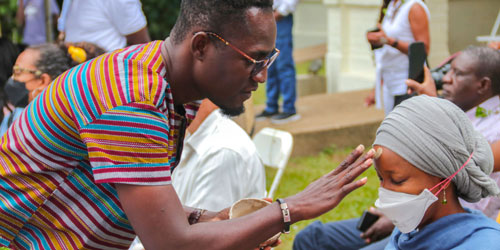
MacArthur President John Palfrey shares what the Foundation and its partners are doing to name and combat racism in the face of a global pandemic.
Times of crisis reveal values in ways that little else can.
We have witnessed incredible unity in every community, city, country, and continent, as people work together to safeguard our collective health and well-being and slow the spread of a global pandemic.
We have also seen fear, paranoia, and blame, disproportionately directed toward Asians and Asian Americans. What we are facing is not only a humanitarian crisis; it is a crisis of racism.
Racism is a contagion that existed long before COVID-19. Unlike the rapidly evolving novel coronavirus, we know the antidote to racism.
It starts with naming it.
Asian Americans Advancing Justice (AAAJ) has created a series of resources in response to the way Asian Americans have been targeted by racism and xenophobia related to the coronavirus.
In addition to documenting, tracking, and addressing hate, AAAJ is working with media, members of Congress, and partner organizations to ensure the public stays informed. “Words matter. Deliberate use of names for COVID-19 like ‘Chinese virus’ or ‘Chinese Coronavirus’ is racist and irresponsible—it only spreads stigma and fear and increases the violent xenophobic attacks on the Asian American community,” one of its statements reads.
We must do more than just call racism out when we see it. We have a responsibility to interrogate our decisions and actions and tackle the pernicious effects of historic and present-day racism and the structures, systems, power dynamics, and practices that perpetuate it.
In a joint response to COVID-19 from Chicago’s affinity philanthropy organizations, including Asian Americans and Pacific Islanders in Philanthropy, MacArthur and others were called on to implement practices that advance equity and trust.
“Recent discussions across the sector about the need to shift our practices to focus on racial justice and power-sharing must move from idea to action. In this moment we must embody the approach of trust-based philanthropy and use a racial justice lens to appropriately respond to a crisis that is the result of structural failures, institutional negligence, and the underfunding of services for our communities,” read the letter, which was signed in solidarity by Chicago Latinos in Philanthropy and Chicago African Americans in Philanthropy, all of which MacArthur supports.
MacArthur’s Program Officers are reaching out to all current grantees and borrowers to identify responsive ways of partnering through the pandemic and to provide the maximum amount of flexibility possible in the continued work that is our joint mission.
I am confident that, in this crisis, there is hope in unity.
Recognizing the urgent need to take action, MacArthur has joined with local funders, in Chicago and in the state of Illinois, to support nonprofits serving people and communities hit hardest by the COVID-19 pandemic.
MacArthur’s staff have also committed personal charitable donations to organizations supporting the most marginalized and many have asked me what we can do to address the troubling anti-Asian racism we have seen. MacArthur matches staff donations, typically on a 3:1 basis. But to meet this extraordinary global need, and to support organizations that specifically serve vulnerable populations and targeted people, MacArthur is matching staff donations to eligible organizations that are focused on the current crisis triggered by the spread of the COVID-19 virus on a 5:1 basis. This time-limited expansion of our matching gifts will broaden our support and bolster organizations responding to the pandemic.
We are not alone. Many others are doing important work to challenge misinformation, promote equity in our response to the pandemic, and advocate for all in our communities. We will continue to share the work of our partners.
We must work with common purpose, and we must continue to live our shared values. When one of us is vulnerable, we are all vulnerable. When we face a crisis as one, we are resilient and strong. Now, more than ever, we are interconnected. To safeguard our global community, we must combat racism and misinformation, support compassionate action, and face the future together.



